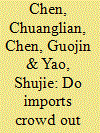| Srl | Item |
| 1 |
ID:
116525


|
|
|
|
|
| Publication |
2012.
|
| Summary/Abstract |
A decline in the relative price of imported goods compared to that of domestically produced goods, e.g., caused by domestic currency appreciation, may have different effects on domestic consumption. Such effects may not be accurately detected and measured in a classical permanent-income model without considering consumption habit formation as pointed out by Nishiyama (2005). To resolve this problem, this paper employs an extended permanent-income model which encompasses consumption habit formation. Both cointegration analysis and GMM are used to estimate the (modified) intertemporal elasticities of substitution (IES) between imports and domestic consumption and the parameters of habit formation as well as the (modified) intratemporal elasticities of substitution (AES). We find that import and domestic consumptions are complements in China, but substitutes in Japan and Korea. Different per capita incomes and consumer behaviors between China and the other two countries are two possible reasons for different relationships between import and domestic consumptions.
|
|
|
|
|
|
|
|
|
|
|
|
|
|
|
|
| 2 |
ID:
175254


|
|
|
|
|
| Summary/Abstract |
The existing climate models ignore the behavioral anomalies of households and conclude that the optimal environmental tax rate should comove with business cycles. However, this assumption has received extensive criticism recently. To this end, this paper studies the optimal emissions tax rate when households are bounded rational. In particular, we calculate the optimal climate policy in a dynamic stochastic general equilibrium (DSGE) model that features households with habit formation (internal habits) and social comparisons (external habits). Compared to the benchmark model without consumption externality, the social comparisons model amplifies consumption volatility but produces a similar response of pollutant emissions in the presence of the three types of economic shocks considered. In contrast, the habit formation model decreases the volatility of both consumption and pollutant emissions. In contrast to the previous result that the optimal emissions tax rate should be procyclical, we find that the social comparisons model largely mitigates the procyclicality of optimal emissions tax rates, and the optimal emissions tax rates under the habit formation model remain constant in response to all the economic shocks considered.
|
|
|
|
|
|
|
|
|
|
|
|
|
|
|
|